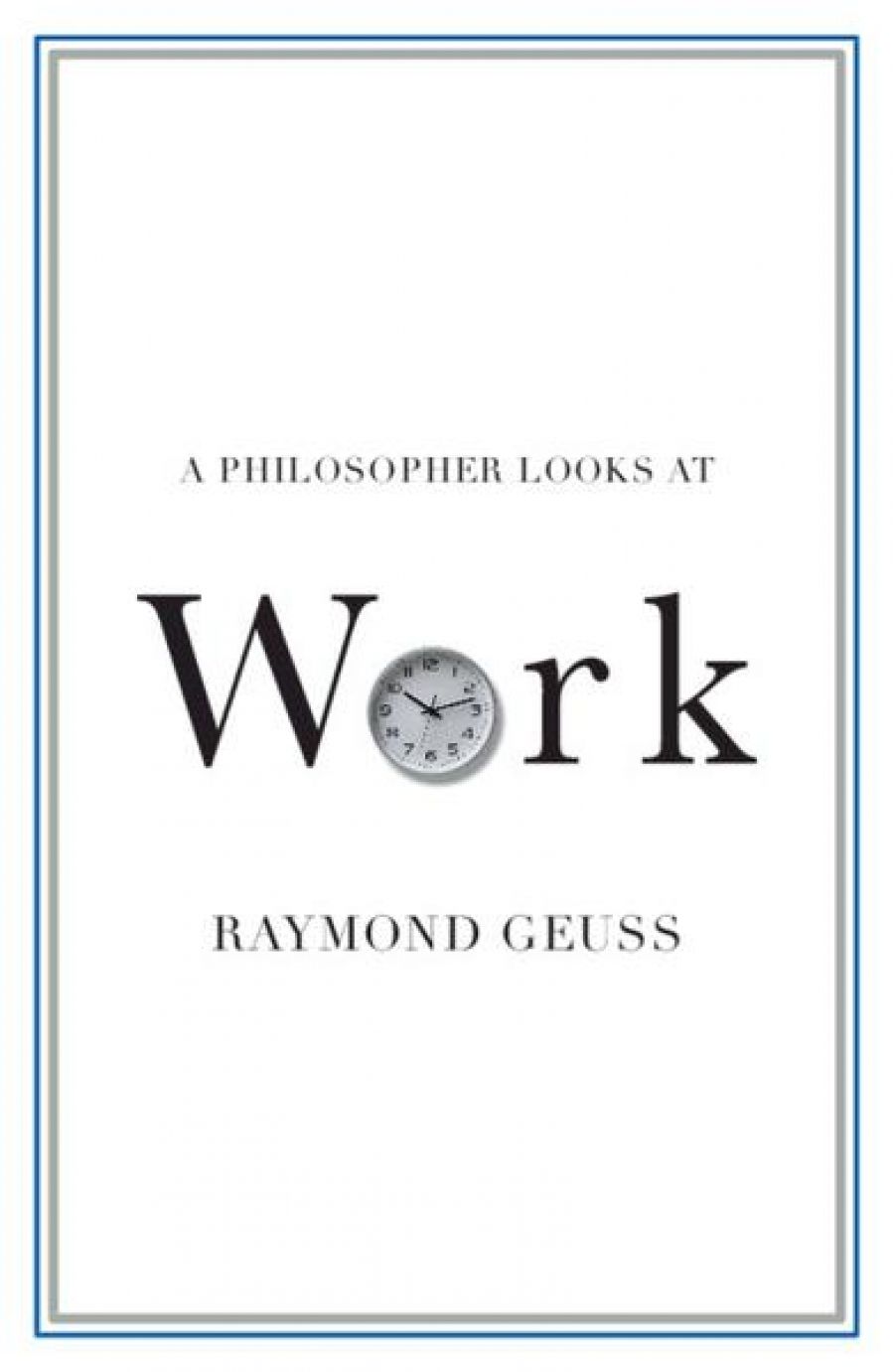
- Free Article: No
- Contents Category: Philosophy
- Review Article: Yes
- Article Title: On not getting out of bed
- Article Subtitle: Examining the nature of work
- Online Only: No
- Custom Highlight Text:
One consequence of the pandemic is that it has led many people to imagine themselves as someone else. Those whose work has dried up – actors, musicians, curators, librarians, flight attendants, and so on – have suddenly had to adapt to a world that has no place for the things they do and thus no place for people like them. What if this new world is not just a temporary blip, but the shape of things to come? Who will I be in this future world?
- Featured Image (400px * 250px):

- Alt Tag (Featured Image): Nicholas H. Smith reviews 'A Philosopher Looks at Work' by Raymond Geuss
- Book 1 Title: A Philosopher Looks at Work
- Book 1 Biblio: Cambridge University Press, $18.95 pb, 195 pp
- Book 1 Readings Link: booktopia.kh4ffx.net/OR44VK
Whether we think of work as a self-defining activity or merely a source of income, there seems little doubt that work is a central feature of our lives. For better or worse, it goes a long way to shaping who we are and who we imagine ourselves to be. This should be obvious, but it is not how Raymond Geuss, emeritus professor of philosophy at Cambridge University, sees it. In fact, Geuss takes work to be a thing of the past, a matter for ‘historical anthropology’ rather than ‘treatment of current events’.
It isn’t always clear what exactly we are supposed to have left behind. Sometimes it seems to be industrial labour, factory work of the kind Geuss’s father did. It’s true there isn’t much of that around anymore, so long as we leave to one side China, Vietnam, or that little corner of the globe.
At other times, it is the work common to agricultural peasants and industrial labourers that has been consigned to history: strenuous ‘by the sweat of thy brow’ stuff that produces the necessities of life. It’s a moot point whether hunter-gatherers and shepherds also did work in that sense on a regular basis. Geuss speculates about how our hunter-gatherer ancestors were duped into thinking a life of endless toil would be an improvement on their congenial cycle of hunting, feasting, and lengthy naps. I wasn’t sure of the lesson to be drawn from this discussion. If I struggle to get out of bed in the morning, I might take solace in the thought that my hunter-gatherer ancestors were all lazy. But I’d be much better off getting up.
Geuss believes that our attitudes towards hard work are obsolete, and he has a dim view of the work ethic. In this he resembles another Cambridge philosopher, Bertrand Russell. Russell famously wrote in praise of idleness, even though he was a complete workaholic himself. Geuss tells of the fierce work ethic instilled in him as a child. His father had him believe that the whole of human life should be lived ‘on a production basis’: no ‘posturing, fancy reasoning, excessive expression of feeling, etc’. Avoiding those things might not be such a bad idea, but to take the ‘ethos of steel production’ as ‘the ideal to which one should aspire in all respects and all domains’ is pushing it a bit far.
Geuss also considers the social structures of work, and the attitudes we have towards them, to be largely anachronistic. We tend to think of work as following a hierarchy of jobs, careers, professions, and vocations. Geuss makes some interesting observations on this hierarchy, but he has a peculiar view of where housework fits into it. Housework isn’t a job, he argues, not because it is unpaid, but because it isn’t packaged into discrete units and has no natural endpoint. I wonder what boy scouts doing bob-a-job would think about this. Having been one myself a long time ago, I had no trouble cleaning a step for one bob, cutting privets for another, and so on. Thinking of housework as a series of distinct jobs also strikes me as a good way of dividing the housework: dishwashing and vacuuming for me, clothes washing and cooking for you. The fact that this work needs to be repeated every day and in some sense is never finished surely makes it even more important to treat domestic chores as discrete, job-like packages of work.
A fair distribution of labour and its rewards is as crucial for justice in the household as it is in other spheres of life. Work is a paradigmatic site of struggle against injustice, but there is barely any discussion of it in Geuss’s book. Geuss rightly calls out the laughable view that we live in a meritocracy where those at the top, the super-rich and powerful, get what they deserve. But desert is an indispensable part of the just ordering of any cooperative effort. If I do more than my fair share of the housework, for example, and this isn’t recognised or compensated in some way, I suffer an injustice which I am entitled to get angry about. The injustice of unrecognised contribution abounds in workplaces as well as households, and it is often the same people who suffer it.
Geuss concludes with a bleak but not unfamiliar vignette of the future of work: robots taking all the jobs, mass unemployment, contingent and micromanaged work for the rest. Some trends are taking us in that direction, others aren’t. We should look at where those other trends might take us before giving up hope.


Comments powered by CComment